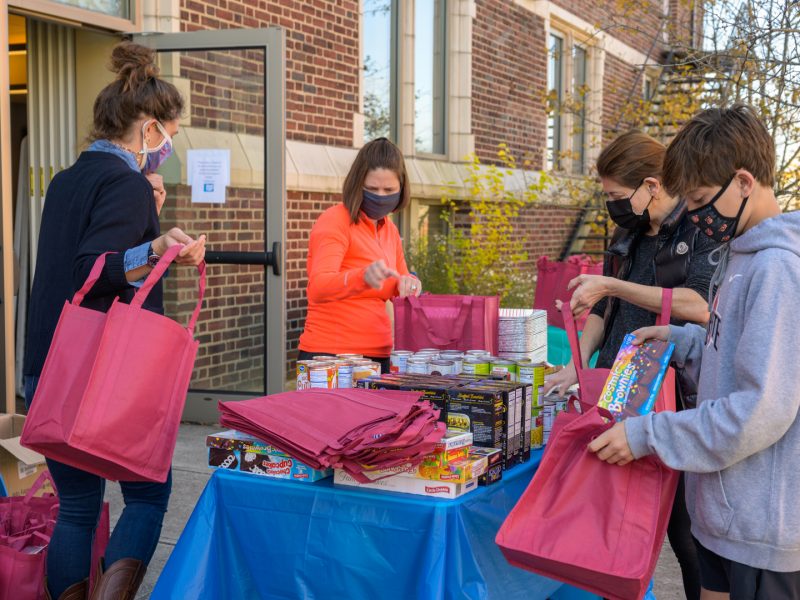David Harris

Jewish Community Embraces Those in Need: Newly Created COVID-19 Relief Fund to Allocate $1.4 Million Locally
In November, the newly created COVID-19 Relief Fund allocated grants totaling $699,950 to 19 local Jewish organizations that applied for pandemic-related funding. The fund is focused on improving the lives of those in our community whose financial stability or mental health have been harmed by the pandemic. This fund is coordinated by the Jewish Federation of Cincinnati, and runs as a collaboration between the Federation, The Jewish Home of Cincinnati, The Jewish Foundation of Cincinnati, and community members.
“This community comes together in times of need—and is so generous in its giving. The COVID-19 Relief Fund is proof of that,” said Danielle V. Minson, Chief Development Officer and Managing Director. She particularly noted the generosity of private donors, who have given a total of $550,000 to date. The Federation raised a total of $1.4 million from these private donors but also by partnering with The Jewish Foundation of Cincinnati and The Jewish Home of Cincinnati. The Foundation, the Jewish Home, and the Federation itself each contributed $250,000.
Day to day, this temporary fund is run by a committee of community volunteers and professionals including those from the Foundation, Federation, and Jewish Home; and led by veteran Jewish community volunteers Suzette Fisher and Sherri Symson, and organized by the Jewish Federation’s Director of Strategic Impact, Jan Evans.
Two rounds of grants, with the possibility of more
Twenty-one organizations requested $1.9 million in funding. The funding committee allocated almost $700,000 in this first round. Organizations funded include numerous education/youth-focused organizations, six congregations, and larger organizations like Jewish Family Service and the Mayerson JCC. Another $700,000 has been held back to be allocated after a second round of funding requests is received in December. The applications are open to all local Jewish organizations, not just those who currently receive allocations through the Federation.
According to Suzette Fisher, the committee is holding open the possibility of more rounds, if more donations are received, given the ongoing nature of the ramifications of COVID-19. Federation is hearing from our partner organizations that the demand for services has grown in November and December and we anticipate the needs will exceed our original goal. Federation is committed to continuing to raise dollars to support these growing needs. If the donations are received by December 31, they would be matched at 50 percent by our national umbrella organization, the Jewish Federations of North America. This match, called the Human Services Relief Matching Fund, ends December 31.
Different areas of need
The committee found four key areas of need:
- Basic needs (i.e. food, shelter, transportation, job loss, and essential living expenses), are being funded by private donors.
- The area of mental health (i.e. support to address the effects of social isolation and financial stress, especially on older adults, youth, and vulnerable populations), is also being funded by private donors.
- The safe delivery of programs and services is funded by the Jewish Federation and the Jewish Foundation.
- Services specific to seniors, including addressing the effects of social isolation through technology and tech support, food insecurity, and emergency financial assistance, is funded by the Jewish Home.
One significant cross-community need that emerged was the need for financial help for those who historically have not needed it, and may not be comfortable with or know about the help that is available; the funding committee found multiple ways to address these concerns.
A second area of need that the committee discovered crossed multiple organizations was mental health for teens and young adults, due to the dual stressors of social isolation and financial hardship. Rachel Kaplan, the Executive Director of Cincinnati Hillel, said, “Even before COVID, one of the top mental health issues facing college students was loneliness. COVID has amplified that to the tenth degree.”
A new level of collaboration
This level of community coordination on grant-giving had never been done before in Cincinnati’s Jewish community. The COVID-19 Relief Fund allocations committee includes experienced volunteers from the community, representing the Jewish Foundation, the Jewish Home, and Federation’s Planning & Allocations executive committee. “I am thrilled at how smoothly it went,” said Jan Evans, “because we’ve never done anything quite like this before. The experience and creativity of the members of the committee were incredible.”
Looking to the next two years
Halfway through their expected two-request cycle, the COVID-19 Relief Fund committee remains focused on the present, but also the future health of our community. “This is what Federation does: a bird’s eye view that brings the community together to figure out how to best serve the entire community,” said Fisher. “We [on the committee] expect the needs to continue as COVID’s effects ebb and flow over the next two years. We will closely monitor the continuing needs. Especially if more people lose their jobs, we are going to need more.”

